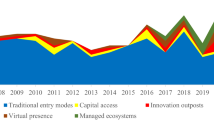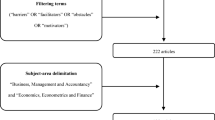Abstract
Most of the literature on innovation has focused on high-income nations with strong neoliberal economies, in which faculty become actors immersed in global markets and ecosystems of knowledge transfer. Based on the concepts of techno-nationalism and techno-globalism, this study contrasts a country representative of these innovation systems, the United States, with a representative of a middle-income economy having an R&D strategy heavily regulated and controlled by the government for national interests, Turkey. We developed a survey investigating the academic profession in relation to university–industry linkages and implemented it among faculty at the University of Missouri in the USA and Hacettepe University in Turkey. We found that faculty in the USA tend to be more entrepreneurial than Turkish faculty, seizing opportunities to capitalize on networks of knowledge and placing high value on networking and collegiality with industry representatives. Ironically, faculty in Turkey ended up much more involved with industry due to the aggressive funneling of resources and incentives on the part of the government. Government-centralized approaches to R&D might result in research better aligned with national priorities and, some might argue, with the public good, but perhaps with an even higher toll on university autonomy and academic freedom than market-based approaches.
Similar content being viewed by others
References
Al-Haija, Y. A., & Mahamid, H. (2021). Trends in higher education under neoliberalism: Between traditional education and the culture of globalization. Educational Research and Reviews, 16(2), 16–26.
Alves, M. G., & Tomlinson, M. (2021). The changing values of higher education in England and Portugal: Massification, marketization and public good. European Educational Research Journal, 20(2), 176–192.
Anderson, M. S., Ronning, E. A., De Vries, R., & Martinson, B. C. (2010). Extending the Mertonian norms: Scientists’ subscription to norms of research. The Journal of Higher Education, 81(3), 366–393.
Boardman, P. C. (2009). Government centrality to university–industry interactions: University research centers and the industry involvement of academic researchers. Research Policy, 38(10), 1505–1516.
Boden, R. (2004). Scrutinising Science: The Changing UK Government o Science. (Ed.). Palgrave Macmillan.
Cantwell, B., & Grimm, A. (2018). The geopolitics of academic science. In B. Cantwell, H. Coates, & R. King (Eds.), Handbook on the politics of higher education (pp. 130–148). Edward Elgar Publishing.
De Fuentes, C., & Dutrénit, G. (2012). Best channels of academia–industry interaction for long term benefit. Research Policy, 41(9), 1666–1682.
Dayioglu Ocal, S., & Kavak, Y. (2018). Revisiting Academic Capitalism in Turkey: An Interactional Model for University-Industry Collaboration. Athens Journal of Mediterranean Studies, 4(2), 107–122.
Ergül, H., Coşar, S., & Mous, A. F. (2017). Transformation, reformation or decline? The university in contemporary Morocco and Turkey (p. 145–177). In Ergül, H. & Coşar, S. (Eds.), Universities in the Neoliberal Era. Palgrave Macmillan.
Ernst, D. (2009). A New Geography of Knowledge in the Electronics Industry? Asia’s Role in Global Innovation Networks. East-West Center.
Felker, G. (2009). The political economy of Southeast Asia’s techno-glocalism. Cambridge Review of International Affairs, 22(3), 469–491.
Findlow, S., & Hayes, L. A. (2016). transnational academic capitalism in the Arab Gulf: Balancing global and local, and public and private, capitals. British Journal of Sociology of Education, 37(1), 110–128.
Fosnacht, K., Sarraf, S., Howe, E., & Peck, L. E. (2017). How important are high response rates for college surveys? Review of Higher Education, 40(2), 245–265.
Gonzáles, L. D., & Nuñez, A. M. (2014). The ranking regime and the production of knowledge: Implications for academia. Education Policy Analysis Archives, 22(31).
Gumport, P. J. (2002). Universities and knowledge: Restructuring the city of intellect. In S. Brint (Ed.), The future of the city of intellect: The changing American university (pp. 47–81). Stanford University Press.
Kauppinen, I. (2012). Towards transnational academic capitalism. Higher Education, 64(4), 543–556. https://doi.org/10.1007/s10734-012-9511-x
Kauppinen, I. (2014). Different meanings of ‘knowledge as commodity’ in the context of higher education. Critical Sociology, 40(3), 393–409.
Kezar, A. (2004). Obtaining integrity? Reviewing and examining the charter between higher education and society. Review of Higher Education, 27(4), 429–459.
Kocabaş, C. & Alpaydın, Y. (2018). Üniversite-Sanayi İşbirliği Bağlamında Teknoloji Geliştirme Bölgelerinin Misyon ve Vizyonlarının İncelenmesi” [Investigation of Missions and Visions of Technology Development Regions in The Context of University-Industry Cooperation]. Yükseköğretim ve Bilim Derrgisi [Journal of Higher Education and Science]. https://doi.org/10.5961/jhes.2018.278.
Lam, A. (2011). What motivates academic scientists to engage in research commercialization: ‘Gold’, ‘ribbon’ or ‘puzzle’? Research Policy, 40(10), 1354–1368.
Marginson, S. (2013). The impossibility of capitalist markets in higher education. Journal of Education Policy, 28(3), 353–370.
Mendoza, P. & Dorner, L. (2020). The neoliberal discourse in Latin American higher education: A call for national development and tighter governmental control. Education Policy Analysis Archives, 28(176). https://doi.org/10.14507/epaa.28.5610.
Mendoza, P., Dayioglu, S., Wang, Z., & Zhou, E. (2020). Faculty norms and university/industry linkages in STEMM. Studies in Higher Education., 45(7), 1474–1487.
Mendoza, P. (2015). Industry-academia linkages: Lessons from empirical studies and recommendations for future inquiry. In J.C. Smart, M.B. Paulsen (Eds.), Handbook of Higher Education: Research and Theory, Vol., 30, 469–523.
Mendoza, P., Kuntz, A., & Berger, J. B. (2012). Bourdieu and academic capitalism: Faculty “Habitus” in materials science and engineering. Journal of Higher Education, 83(4), 558–581.
Mendoza, P., & Berger, J.B. (2008). Academic capitalism and academic culture: A case study. Education Policy Analysis Archives, 16(23).
Mendoza, P. (2007). Academic capitalism and doctoral student socialization: A case study. Journal of Higher Education, 78(1), 71–96.
Merton, R. K. (1973). The sociology of science: Theoretical and empirical investigations. University of Chicago Press.
Meyer, M. (2006). Are patenting scientists the better scholars? An exploratory comparison of inventor-authors with their non-inventing peers in nanoscience and technology. Research Policy, 35(10), 1646–1662.
Mitroff, I. (1974). Norms and counter-norms in a select group of the Apollo moon scientists: A case study of the ambivalence of scientists. American Sociological Review, 39(4), 579–595.
Nakayama, S. (2012). Techno-nationalism versus Techno-globalism. East Asian Science, Technology and Society: An International Journal, 6(1), 9–15.
National Science Board, National Science Foundation. (2020). Science and Engineering Indicators 2020: The State of U.S. Science and Engineering. NSB-2020-1.
Ostry, S. & Nelson, R.R. (1995). Techno-Nationalism and Techno-Globalism: Conflict and Cooperation. Brookings Institution
Powell, W. W., & Snellman, K. (2004). The knowledge economy. Annual Review of Sociology, 30, 199–220.
Perkmann, M., Salandra, R., Tartari, V., McKelvey, M., & Hughes, A. (2021). Academic engagement: A review of the literature 2011–2019. Research Policy, 50(1), 104–114.
Perkmanna, M., Tartari, V., McKelvey, M., Autio, E., Broström, A., D’Este, P., et al. (2013). Academic engagement and commercialisation: A review of the literature on university-industry relations. Research Policy, 42, 423–442.
Powell, W. W., & Owen-Smith, J. (2002). The new world of knowledge production in the life sciences. In S. Brint (Ed.), The future of the city of intellect: The changing American university (pp. 107–132). Stanford University Press.
Sá, C., & Sabzalieva, E. (2018). Scientific nationalism. In Cantwell, B., Coates, H., King, R. (Eds.), Handbook on the Politics of Higher Education. Edward Elgar.
Shane, S. A. (2004). Encouraging university entrepreneurship? The effect of the Bayh-Dole Act on university patenting in the United States. Journal of Business Venturing, 19(1), 127–151.
Shim, Y., & Shim, D. S. (2018). Neo-technonationalism: The case of China’s handset industry. Telecommunications Policy, 40(2/3), 197–209.
Siegel, D. S. (2018). Academic entrepreneurship: Lessons learned for technology transfer personnel and university administrators. In D. Libaers & D. Dunlap (Eds.), World scientific reference on innovation (pp. 1–21). World Scientific Publishing.
Slaughter, S., & Rhoades, G. (2004). Academic capitalism and the new economy: Markets, state, and higher education. The Johns Hopkins University Press.
Slaughter, S., & Cantwell, B. (2012). Transatlantic moves to the market: the United States and the European Union. Higher Education, (5), 583–606.
Szczygielski, K., Grabowski, W., Pamukcu, M. T., & Tandogan, V. S. (2017). Does government support for private innovation matter? Firm-level evidence from two catching-up countries. Research Policy, 46(1), 219–237.
Szelényi, K., & Goldberg, R. A. (2011). Commercial funding in academe: Examining the correlates of faculty’s use of industrial and business funding for academic work. The Journal of Higher Education, 82(6), 775–802.
Szelényi, K., & Bresonis, K. (2014). The public good and academic capitalism: Science and engineering doctoral students and faculty on the boundary of knowledge regimes. The Journal of Higher Education, 85(1), 126–153.
Unsal, N. (2019). Technoparks in Turkey: A descriptive study. In Amoroso, S., Link, A., Wright, M. (Eds.), Science and Technology Parks and Regional Economic Development. Palgrave Advances in the Economics of Innovation and Technology. Palgrave Macmillan
U.S. Patent and Trademark Office (USPTO). (2018). Section 1502: Definition of a Design. In Manual of Patent Examining Procedure (MPEP). 9th ed., Revision 08.2017.
Yardımcı, A., & Müftüoğlu, E. B. (2015). Üniversite-sanayi işbirliğine sanayi kesiminin bakışı [The view of the industry to the university- industry linkage]. Ankara Üniversitesi SBF Dergisi, 70(4), 815–838.
Yildiz, T., & Aykanat, Z. (2015). Clustering and innovation concepts and innovative clusters: An application on Technoparks in Turkey. Procedia - Social and Behavioral Sciences, 195(3), 1196–1205.
Youtie, J., & Shapira, P. (2008). Building an innovation hub: A case study of the transformation of university roles in regional technological and economic development. Research Policy, 37(8), 1188–1204.
Funding
This study was supported by the Scientific and Technological Research Council of Turkey.
Author information
Authors and Affiliations
Corresponding author
Ethics declarations
Conflict of Interest
The authors declare that they have no conflict of interest.
Additional information
Publisher’s Note
Springer Nature remains neutral with regard to jurisdictional claims in published maps and institutional affiliations.
Rights and permissions
About this article
Cite this article
Mendoza, P., Öcal, S.D. Faculty Engagement in University–Industry Linkages in Turkey and the United States: National Technocenters versus Ecosystems of Knowledge. High Educ 84, 723–740 (2022). https://doi.org/10.1007/s10734-021-00796-3
Accepted:
Published:
Issue Date:
DOI: https://doi.org/10.1007/s10734-021-00796-3




